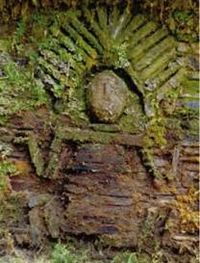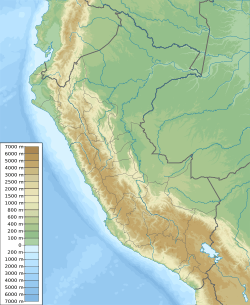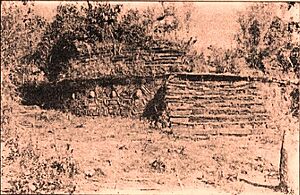Gran Pajatén facts for kids

Relief from the walls at Gran Pajatén.
|
|
| Location | San Martin Region |
|---|---|
| Coordinates | 7°38′56″S 77°25′05″W / 7.649°S 77.418°W |
| Area | 20000 m2 |
| History | |
| Founded | 200 BCE |
| Cultures | Chachapoyas culture |
Gran Pajatén is an amazing ancient place found in the cloud forests of Peru. It sits high up in the Andes mountains. This special site is located right on the border of the La Libertad region and the San Martín region. It lies between two big rivers, the Marañon and the Huallaga river.
Gran Pajatén is part of the Rio Abiseo National Park. This park was created in 1983 to protect nature and history. In 1990, UNESCO named the park a World Heritage Natural Site. Then, in 1992, it also became a Cultural Site. To keep these fragile ruins and the environment safe, you cannot visit Gran Pajatén without special permission. These permits come from Peru's Ministry of Agriculture and National Institute of Culture. Another important ancient site, Los Pinchudos, is very close to Gran Pajatén.
Contents
What is Gran Pajatén?
Gran Pajatén is built on a hilltop. It overlooks the Montecristo River valley. The site has at least 26 round stone buildings. These buildings are placed on many terraces and stairways. The ruins cover a large area, about 20,000 square meters.
Buildings and Art
The main buildings at Gran Pajatén are beautifully decorated. They have mosaics made from slate stone. These mosaics show pictures of people, birds, and cool geometric shapes. Scientists have studied pottery found here. They also used radiocarbon dating to find out how old things are. This shows that people lived in this area as early as 200 BCE. However, the stone buildings you see today were built later, during the time of the Inca Empire. Experts believe the Chachapoyas culture built this settlement. This is mainly based on how the buildings look.
Who Discovered Gran Pajatén?
Many people mistakenly think explorer Gene Savoy found these ruins in 1965. But the real story is a bit different. It's said that a man named Eduardo Pena Meza from Juanjui might have found some ruins around 1940. He was looking for a place to build a road. However, there is no clear proof that what he found was actually Gran Pajatén.
The "discovery" of Gran Pajatén is actually credited to villagers from the town of Pataz. They found the site in 1963. In 1965, these villagers guided Gene Savoy to the site. After that, Savoy told the world press that he had discovered it himself.
Early Protection Efforts
In late 1965, the Peruvian government sent an official team to the site. They started to clear away the plants. By 1966, they had even built a helicopter landing pad. They also removed a lot of the thick plants that protected the site. Years later, people criticized these actions. This was because the archaeological site is very delicate. Without the thick plants to protect them, the stone ruins started to get damaged quickly.
Protecting the Site Today
In 1985, a new research project began at Gran Pajatén. A team from the University of Colorado led this effort. This expedition was widely talked about. It led to more discussions about opening the site for tourists.
In 1990, a Peruvian TV team visited the site. They again cleared away the protective plants. This caused even more damage to the ruins. Today, there are ideas to build roads and tourist places in the area. But these plans have not happened yet. This is because the ruins are very fragile. Also, it costs a lot to protect the site and make sure tourists don't harm it or its natural surroundings. The town of Juanjui is close to Gran Pajatén. You can find some art there that is inspired by the ancient site.
See also
 In Spanish: Gran Pajatén para niños
In Spanish: Gran Pajatén para niños
- Kuelap
- Peruvian Sol
 | William Lucy |
 | Charles Hayes |
 | Cleveland Robinson |



